14 August 2001
Get braver... it's a brave
new world out there!
D. Bruce Stratton, associate
Fool's Gold
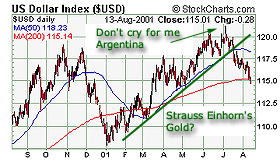 |
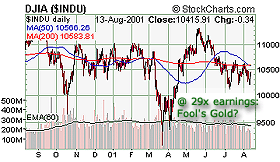 |
| US Dollar Index | Dow Jones Industrial Average |
Cheryl Strauss Einhorn had it backwards in her Barron's article, of the same name, this week when she wrote about the doubtful endurance of the aspiring bullion bull market. Fool's gold, from what I'd learnt on my geology fieldtrips, is not really gold. It is the stuff that we line our walls with when it becomes worthless, kind of like the new economy.
It is the stuff that central banks create on top of a small quantity of real gold… and it is ironic that by beating up the gold sector, today's paper bulls think that they have half a chance at bidding up the dollar, stock market, or conceptual (Greenspan) GDP for that matter. But the more the merrier… fodder for the emerging bull market in gold. This is not all there is to it. It will end when Ms. Einhorn turns bullish (jab).
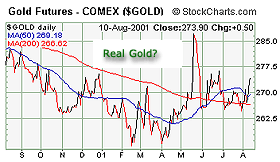 |
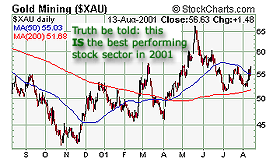 |
| Gold Prices | XAU Gold Mining Stocks |
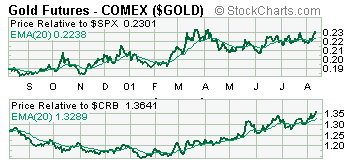 |
Price of Gold relative to the S&P 500 Index |
| Price of Gold relative to the CRB Index |
And you can take "that" to the bank. What's more is that there is only one reason that bond yields are still in the 5% range, and it is the same reason that gold prices are, in fact, firmer: the stock market is just dying to crash. Sorry, we don't have a date for you, only a vague notion that it will be the next meaningful move.
It is only a matter of time. Thanks largely to the easy money Fed, Wall Street bulls have been allowed to use the same old tired story: that it is the technology stocks, which are going to lead the stock market and economy out of the doldrums. And this just after the bulls failed to break this sector out, again. In fact, there is not a stock sector in the US market, which looks as bad as some of these stocks do on the charts at the moment. Their technical condition has deteriorated markedly over the course of August.
Conversely, outside of the REIT index, there is not a better looking stock chart than that of the average gold chart today. And any analyst that can disentangle from their anti gold bias should be able to spot that. Another fact is that gold has outperformed every single paper currency this year, including the dollar.
Consider the best performing stock sectors this past week (Aug 6-13):
| XAU - gold mining index | +6.27% |
| REIT's - real estate | +1.56% |
| Oil Index | +1.24% |
| Drug Stocks | +1.09% |
| MS Commodity Related Stocks Index | +1.07% |
Why is nobody telling you about how far behind the gold stocks are leaving the rest of the market? Maybe because they are all still long the rest of the stock market. Now that's a bad sign.
But the main reason that investors ought to get bullish on technology stocks again, according to Ned Smiley (state street global advisors), is that nobody expects these stocks to come back any time soon, and therefore, that the contrarian would be wise to load up. The irony is twofold.
First of all, the Dow is only spitting distance from its most expensive levels in history, leaving the contrarian no choice but to be bearish, at least on the blue chips. Second, if there is one sector in the whole wide WORLD where investment sentiment is most bearish, it sure the heck is gold, not paper, especially not US dollar denominated paper. The Barron's article this week is proof of that.
So the stupidity continues. And if there is only one reason to take the other side of that bet, it is that there still exists a job for friendly promoters like Mr. Smiley (Riley).
The
Market Fights the Fed
There is only one thing for investors to do today, and that is to sell
all dollars, stocks and bonds, and to buy gold, and gold stocks instead.
The market will force this very outcome, in our opinion, and indeed, it
is already doing that… the market is fighting the Fed.
The sheer controversy of that statement alone is enough reason for us to get bullish on gold. But please don't try that smugness at home. The biggest reason of all, to buy gold, for real, is that everybody else says that they don't see any inflation either now or for the future.
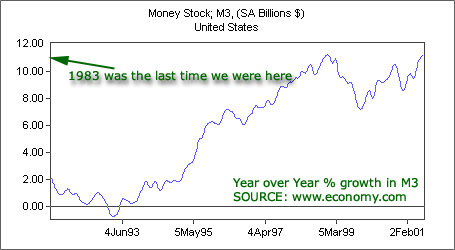
Mr. Magoo continues to lead the blind. Money supply (M3) growth rates have not been this high since the early eighties. In fact, 11% year over year growth in money supply was the average rate of growth from 1970 to 1983. Over that period of time, the dollar lost approximately 75% of its value.
Look at that chart, and don't take your eyes off of it while you think about where all of those credits are going to go. And while you do that, we'll discuss one of the tools of that reallocation in, or confiscation of, your wealth.
Inflation is neither a rising general price level nor a rise in prices, but rather, it is the simple expansion of the money supply. Rising prices are the (hoped for & normally controlled) outcome.
The
Machiavellian Dollar Policy
It's high time that we replace the phrase "Strong dollar policy"
with not just a more appropriate, but also a more accurate, phrase. In
Niccolo Machiavelli's most famous work, The Prince, he had read,
observed and disseminated the most effective tools of the great leaders
- the methods by which power can be acquired and maintained, in view of
the true nature of effective and powerful leadership.
What separates him from other political philosophers, perhaps even since then, is the callous pragmatism of his ideas, which seem to have no ethical bound, but in their ultimate objectives. Machiavelli believed that traditional ethical forms do not apply to a ruler, as his goal is to single-mindedly acquire more power.
In (Machiavelli's) view, a prince should be concerned only with power and be bound only by rules that would lead to success in political actions. Machiavelli believed that these rules could be discovered by deduction from the political practices of the time, as well as from those of earlier periods - Encarta Encyclopedia
Consequently, his name has come to be equated with cunning, manipulative, and even conniving politics, and his work is the epitome of the idea that the end justifies the means.
But we have only one problem with that. Life is about the means not the end. The end is inconsequential because when it comes, most likely we will not even know it has arrived.
Nonetheless, our theory is that the objective of the Treasury's strong dollar policy, particularly when combined with a central bank's inflation agenda, is to acquire and maintain political and economic power, by any means that will succeed.
Thus the term, strong dollar policy, is misleading because it sounds like an objective, or a goal, rather than an active policy tool, which it really is.
And should anyone disagree with us, they are simply wrong. We can and will defend our new, more descriptive, phrase for US currency policy: the Machiavellian dollar.
As with everything else Machiavellian, it has boundless utility in what it may acquire.
Let's
Consider the Real World
Both, the yen and euro are gaining momentum now, and that has everything
to do with the failure of dollar policy to provide the world with a stable
unit of account, as well as a trustworthy store of value. Rather, it has
become a self-serving tool, which conveniently exports the Fed's excess
inflation while trying to reallocate part of it, a process that is highly
destructive in reverse, and which has left one global currency crisis
after another in its wake.
This time, Argentina is feeling the pain of accepting the obligations of Dollarization, which currency policy this year has brought demand in the region to a screaming halt and has inflated the value of their obligations to Citibank.
Not a good advertisement, if you're trying to persuade the world to dollarize. But, I suppose that O'Neill and Greenspan did what was in their nature to do as politicians, according to Machiavelli: to acquire more power.
Another (hopefully) unintended byproduct of Machiavellian dollar policy, besides the economic distortions as per our discussion of Say's Law in "Say, Can You See," is the growing protectionist tide in the United States, crystallized on Friday by the US action (19.3% duty) against Canadian Lumber exporters. This is not the first, and there has been a lot of noise about the US steel industry.
While the resulting weaker dollar may bode well for the prospects of an ECB rate cut, down the road, the manipulative tactics of the governors of the Machiavellian dollar has risked their credibility. According to William Dudley, Goldman Sach's chief US economist, last Wednesday:
The longer policymakers persist in their efforts to influence the exchange rate, the greater the danger of an unnecessarily sharp correction becomes. If the dollar began to slide, the credibility of policymakers would be called into question. This could lead to an even greater depreciation, as foreign investors demanded a bigger risk premium on US financial assets.
The story confirms much of our analysis over the past year and I am intrigued by the source, and timing, of the conclusions. How is the crash protection "team" going to take this, coming from one of its own?
Nevertheless, it was as honest a report as I've seen out of Wall Street, even if its intention is to persuade a weak dollar, perhaps for Citibank's sake, since it is likely a good client and has such a large stake in Argentina.
Here is my favorite part of the report:
There are good reasons to suppose that Treasury comments have artificially supported the dollar's valuation somewhat…
...But while the strong dollar rhetoric may have worked to date, continued adherence to it is becoming risky. The fundamentals of the chronic large current account deficit point to a change in the exchange rate over the medium to long term. If the mantra is still in place when this happens, the loss of credibility could exacerbate the dollar's decline.
Policymakers should let market forces determine the dollar's value. Abandoning the strong dollar policy now, when the appetite for US assets is still strong, when policy is still credible, would probably lead to a somewhat weaker currency. But if the decline were controlled, there would be no great harm in that. The alternative - of waiting until the policy falls apart - will make the economic adjustment more painful than it needs to be.
Essentially, this is a public recommendation to Messrs. O'Neill / Greenspan, to allow the dollar to adjust to reality, before reality takes charge.
That said, it will be difficult for the FOMC to lower interest rates during an adjustment in dollar policy like this, controlled or otherwise.
Consequently, allow us to be the first to say, that it cannot be controlled. Any sign that interest rates will not decline anymore, will probably result in the stock market crash that we've been anticipating. Now how appropriate would it be for the stock market to have first crashed near Mr. Greenspan's arrival 14 years ago, and then again on his departure, supposedly some time over the next year?
Conclusion
Like we said two weeks ago, Gold, Energies, and the Grains will lead the CRB out of its correction, paving the way for an inflation breakout.
Good
Luck,
Ed
Bugos
Editor
The Goldenbar Report: is not a registered advisory service and does not give investment advice. Our comments are an expression of opinion only and should not be construed in any manner whatsoever as recommendations to buy or sell a stock, option, future, bond, commodity or any other financial instrument at any time. While we believe our statements to be true, they always depend on the reliability of our own credible sources. Of course, we recommend that you consult with a qualified investment advisor, one licensed by appropriate regulatory agencies in your legal jurisdiction, before making any investment decisions, and barring that, we encourage you toconfirm the facts on your own before making important investment commitments.